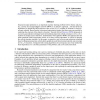95 search results - page 7 / 19 » Reduction Techniques for Instance-Based Learning Algorithms |
117
click to vote
PADL
2010
Springer
15 years 11 months ago
2010
Springer
Explanations are a technique for reasoning about constraint propagation, which have been applied in many learning, backjumping and user-interaction algorithms for constraint progra...
121
click to vote
VLSID
2005
IEEE
15 years 8 months ago
2005
IEEE
The primary advantage of using 3D-FPGA over 2D-FPGA is that the vertical stacking of active layers reduce the Manhattan distance between the components in 3D-FPGA than when placed...
143
click to vote
JCSS
2008
15 years 2 months ago
2008
We use techniques from sample-complexity in machine learning to reduce problems of incentive-compatible mechanism design to standard algorithmic questions, for a broad class of re...
112
click to vote
CORR
2010
Springer
15 years 1 months ago
2010
Springer
Structured output prediction is an important machine learning problem both in theory and practice, and the max-margin Markov network (M3 N) is an effective approach. All state-of-...
135
click to vote
ICML
2005
IEEE
16 years 3 months ago
2005
IEEE
Naive Bayes is an effective and efficient learning algorithm in classification. In many applications, however, an accurate ranking of instances based on the class probability is m...

